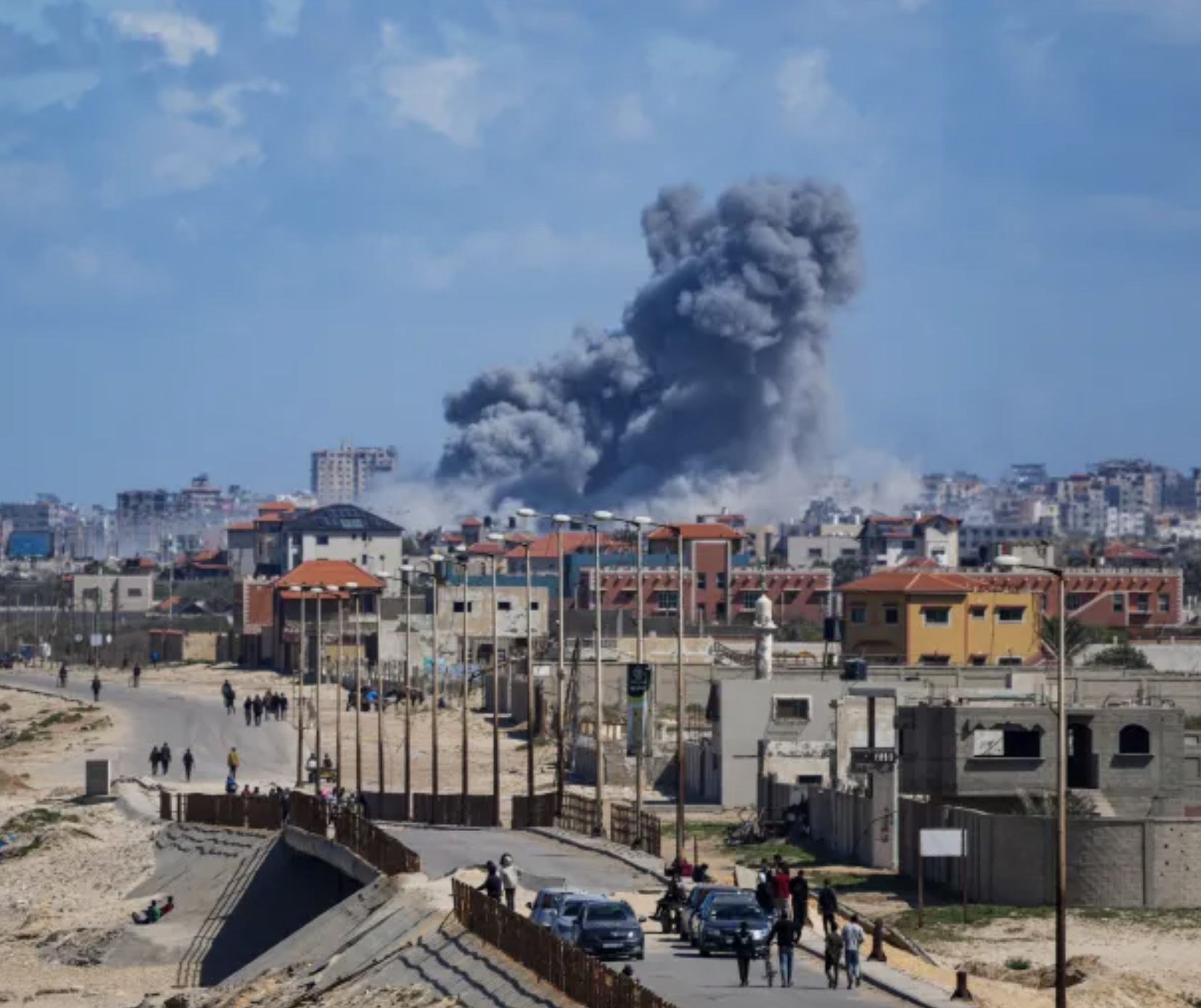How I am surviving the genocide against my people
Smoke rises following an Israeli air strike in the central Gaza Strip. 16 March 2024. Source
It was the evening of Oct. 10, 2023. My family and I were sitting in our home in the Al-Tawam neighborhood of north Gaza. That night, we were trying to find peace of mind, worried about what the future had in store for us.
All of a sudden, bombs started raining from the sky. The windows of our home all shattered as glass, rocks, and concrete went flying everywhere. We lost electricity as smoke and debris filled our home, reducing visibility to zero. We ran to the basement, fearing the next bomb was for us.
That’s when I realized our lives would never be the same again. As we sat in the basement, we looked at each other in silence. My whole family was trembling in fear. Little did we know, a genocide was awaiting us.
If only I had known to plan for a genocide, I would have cherished those last moments at home, my last night in a bed, my last morning coffee, my last kibbe dipped in hummus, my last day at work, my last laugh, my last birthday celebration, my last everything. If only I had known, I would have packed up a few of those memories with me.
But I didn’t have a chance to do that, because we decided to evacuate immediately. That’s one of the horrible things we have to do all the time: Try to guess the least worst option among terrible options.
But we decided to evacuate. My family of 10 squeezed into our car, kids on top of adults. Within a few seconds, there was another massive explosion in front of us.
The next thing I can remember, blood was everywhere in the car. I grabbed my 9 year old brother, Adam, who is handicapped, and I held him tightly.
I still remember the sound of my mom’s voice at that moment. “Adam is dead Heba, I can’t feel him!” she said. I looked at Adam, and told her that he was okay, that he was just in shock. We were all shocked. Somehow, we survived.
I held Adam as we got out of the car and started running back home. My dad was in front of me, the rest of my family was behind me. Who was I supposed to look after?
Adam was too scared to be left alone even for a few seconds, and so I couldn’t leave him. I could feel my hands going numb from holding him so tight. “Dad,” I said. “Help me, I can’t hold Adam anymore.”
My Dad shouted: “My finger is cut Heba, I can’t.” I realized my dad’s hand sliced open and blood was gushing everywhere.
Debris littered the streets, almost looking like an earthquake. But it was not an earthquake. It was a bomb sent to kill us. Maybe it was a dumb bomb, an imprecise bomb, that can land 100 feet away from its target. Half the bombs Israel sends to kill us are dumb bombs.
Israel exports sophisticated military technology to the world, but when it comes to us Palestinians in Gaza, the latest technology is not needed, since Israel’s “focus is on (creating) damage, not on precision.” That’s what an Israeli army spokesperson said on Oct. 10th, 2023, the same day Israel bombed our home.
We rushed to our neighbors house hoping and praying they were home. Their son is a nurse and treated my dad while we waited for an ambulance. Hours passed with no ambulance. We later found out that two of the ambulances that tried to reach us were bombed. Eventually, an ambulance arrived, al-hamdullilah.
We sheltered at al-Shifa hospital while my family was being treated. My 1-year old niece, Sarah, needed stitches in her head and hand. She was in so much shock she couldn’t even cry. My brother Mohammed had a splint in his head, and needed surgery, which we were eventually able to get for him 76 days later. My dad’s hand was so badly wounded the doctors thought they might have to amputate it. But thank god, we cared for it, and cleaned it every day, and he still has his hand.
We took refuge in al-Shifa hospital for a month. We barely had anywhere to sleep and we did not have access to clean water. Every day, hundreds of people would arrive at the hospital, some severely injured, some already dead. The agony of the families of the victims was too much too bare. The only thing I can remember now from al-Shifa was the never ending screams of pain that filled the hallways of the hospital.
Then, we were forced to move to the south, to Khan Younis. We made the dangerous journey on foot. For the first time, I felt what my grandparents must have felt during the Nakba in 1948. I understood why they kept the keys to their homes. Those keys were filled with memories.
We stayed in Khan Younes for 24 days, where we had almost nothing. We had no gas for cooking, no electricity, no means of transportation and no safe place to shelter in. We were among the lucky ones just to be able to take a shower. Then, we were ordered by the Israeli military to leave. We moved again, this time to Rafah.
As I walk through the streets of Rafah today, all I see is fear. The fear of life and the fear of death. We are living in fear every moment of the day. We now also fear that we will never have our lives back.
In this war, who am I? To the world, it seems I am just a number. A person who is counted on a list of people displaced, people injured or people hungry and thirsty. And if the next bomb is for me, I will be another number to add to the number of people killed in the genocide, and then I will be forgotten.
Subscribe to the Palestine Nexus newsletter:


